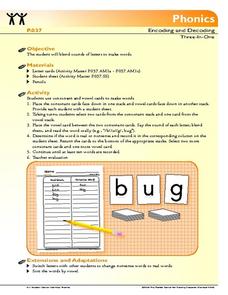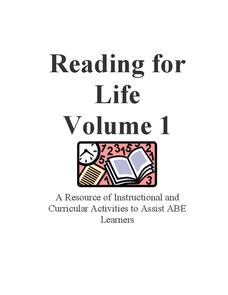Teacher's Corner
Alliteration
Calliope calls kids to craft clever creations in this, the second in a series of ten poetry sessions.
Curated OER
Phonics and Vegetable Books
Students participate in phonemic awareness and phonics activities and develop a list of vegetable vocabulary words. They break up words into beginnings and endings, and trace and write the letter s. Students then create a Vegetable...
Curated OER
Major and Minor Characters
In this reading worksheet, students complete a chart about two characters from a book. Information includes the character names, how they look, how they act, how they interact with others, and how the student might relate to them.
Curated OER
What Do You See at the Pond?
With What Do You See at the Pond?, young readers explore pond life and practice reading strategies. Learners first make predictions and then read the simple story independently. After a second read-through with a partner, kids come...
Curated OER
Spanish Grammar
There are four ways to say "the" in Spanish: el, la, los, and las. This PowerPoint explains when it is appropriate to use either word, lists examples, as well as asks over thirty practice questions. Furthermore, this...
Curated OER
Nouns and Articles
Here is a 114-slide PowerPoint that covers the proper use of articles, singular and plural nouns, and rules of capitalization. Your students should gain valuable practice from working through the examples present in the slides. This is...
Curated OER
Adjectives
After your Spanish scholars have mastered basic adjectives and are more familiar with the Spanish sentence structure, they'll be ready to learn descriptive adjectives. This resource sheet provides definitions, explanations, and examples...
Curated OER
Fill in the Article
Articles are used quite often in writing. "A," "an," and "the" are the words identified in this language arts worksheet. Young writers complete sentences with the eight missing articles. A very good worksheet!
Curated OER
Division of Syllables
Study diphthongs in the Spanish language. This resource contains a lot of information, so consider printing one for each learner to reference and walking them through it as a class. There is a short exercise at the bottom of the page to...
Florida Center for Reading Research
Phonics: Encoding and Decoding, Three-In-One
Scholars use the provided pack of alphabet cards to construct basic CVC words, then write down each word they make in one of two columns. Column one is for real words and column two is for nonsense words.
K12 Reader
Adjectives Can Change Articles
Is it a interesting book or an interesting book? Teach your class when to use a or an when adjectives are involved. Learners write the article for 32 different adjective and noun pairs.
Balanced Assessment
Dog Tags
Class members demonstrate a proficiency with conditional probabilities through this task. Individuals calculate probabilities using multiplication and addition. They also distinguish between repetition and non-repetition while...
Lakeshore Learning
Alphabet Sounds Teaching Tubs
A hands-on activity brings the alphabet to life in your kindergarten! Fill tubs with items that begin with the same letter or end with the same sound, and let kids make the connections between the items.
Alabama Learning Exchange
Phonics lesson for -ew and -oo
First graders identify letters and sounds associated with -ew and -oo sounds. Each learner receives a stack of cards containing these sounds, and they must determine whether the word uses the -ew or the -oo sound. This could easily...
Curated OER
Some Spelling Rules
This presentation offers up some of the trickier rules of the English language when it comes to spelling. For example, one slide goes over the "i before e, except after c," rule. The rest of the slides present examples like this one and...
Curated OER
Animated Alphabet
Students explore English by completing an interactive language history activity. In this word recognition activity, students discuss word formations and the phonetic relationship between letters. Students identify the origin of...
Curated OER
Elements of Poetry
Prepare your learners to identify figurative language in poetry. Tips for reading poetry and what to look for are listed on these slides. Rhetorical devices are defined and plenty of examples are given.
La Jolla High School
Of Mice and Men by John Steinbeck: In Search of Figurative Language
While this resource was originally made to be used in conjunction with John Steinbeck's Of Mice and Men, it could be used for any literary text. A reference sheet for readers, the resource includes terminology related to figurative...
Curated OER
Reading for Life
Imagine a packet packed with reading resources designed for every grade and reading level. Imagine worksheets, graphic organizers, flash cards, activities, and exercises. This is just such a packet and is well worth...
Curated OER
Double Jeopardy-Homophones
Second graders identify homophones as words that sound alike but have different meanings. They, given a pair of homophones, are to explain the meanings of the words using gestures, role playing, or drawing a picture with their partner.
Curated OER
Poetic Elements
Poetry is all about sound and rhythm. The sound of the words, the rhythm of the lines, and the emotional atmosphere created by these elements and the literary devices poets use, compress whole stories into a few stanzas. The specialized...
Learning A-Z
Tips for Teaching: Word Recognition
Learning to read can be exhilarating for some pupils, but for others, it's difficult to get past the frustration of not knowing how to read a particular word. A tutoring resource provides several ways to guide class members into...
Pearson
Articles: Indefinite
When do you use a or an before a noun? What about the? Learn about indefinite and definite articles with a brief grammar presentation, which focuses on using context clues to determine proper article usage.
Curated OER
Phoneme Segmenting Accuracy
Take your kindergartners on a journey to the mythical planet Paz where residents segment words into phonemes, touching parts of their arm with each sound. This physical response to phoneme segmenting will appeal to your physical learners...























